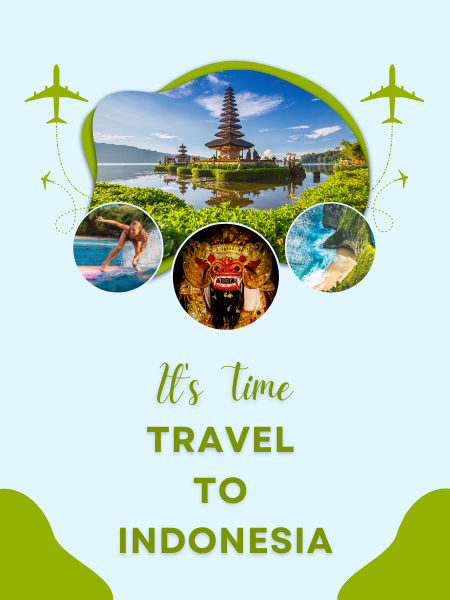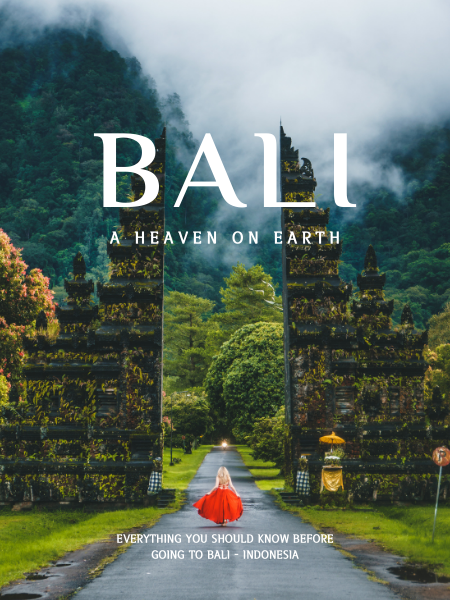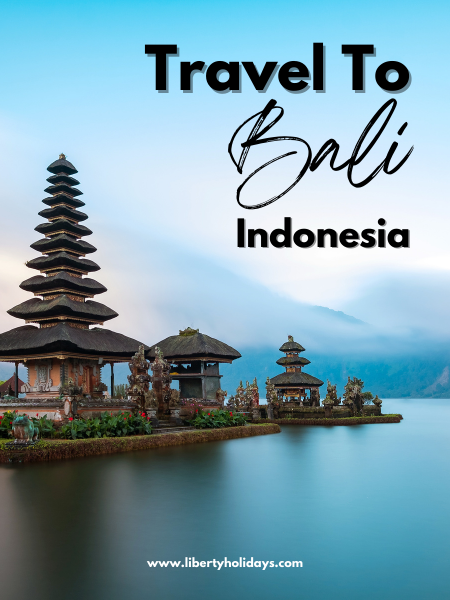
Indonesia Travel Overview
Indonesia is a country that is rich in culture, history, and natural beauty. Located in Southeast Asia, it is the world's fourth most populous country and is home to over 17,000 islands. From the bustling streets of Jakarta to the stunning beaches of Bali, Indonesia is a destination that has something for everyone.
When to Visit
Indonesia is a year-round destination, with the best time to visit depending on the region you plan to visit. The dry season, which runs from May to September, is the best time to visit the islands of Java and Bali, while the wet season, which runs from October to April, is better for visiting the islands of Sumatra and Kalimantan.
Must-Visit Destinations
• Bali: Known for its beautiful beaches, temples, and vibrant culture, Bali is a must-visit destination for any traveler.
• Jakarta: The capital city of Indonesia, Jakarta is a bustling metropolis with a rich history and culture.
• Yogyakarta: Located on the island of Java, Yogyakarta is a city known for its ancient temples and vibrant cultural scene.
• Komodo National Park: Located in eastern Indonesia, Komodo National Park is home to the famous Komodo dragons and stunning coral reefs.
• Lombok: A lesser-known island compared to Bali, Lombok is a hidden gem with stunning beaches and a relaxed atmosphere.
Things to Do
• Explore temples: Indonesia is home to many ancient temples, including Borobudur and Prambanan in Java.
• Enjoy the beaches: With over 3,000 miles of coastline, Indonesia has some of the most beautiful beaches in the world.
• Try local cuisine: Indonesian cuisine is a fusion of different cultures and flavors, with popular dishes including nasi goreng and gado-gado.
• Take a cooking class: Learn how to make traditional Indonesian dishes with a cooking class.
• Go trekking: Indonesia has many mountains and forests that are perfect for trekking.
Cultural Insights
• Respect for Islam: Indonesia is the world's largest Muslim-majority country, and it's important to respect Islamic customs and traditions.
• Dress modestly: When visiting temples or mosques, it's important to dress modestly.
• Learn some basic Indonesian phrases: While many Indonesians speak English, learning some basic phrases such as "hello" (halo) and "thank you" (terima kasih) can go a long way in showing respect for the culture.
Practical Information
• Visa requirements: Citizens of many countries can enter Indonesia without a visa for up to 30 days.
• Vaccinations: Consult your doctor or a travel clinic about necessary vaccinations before traveling to Indonesia.
• Currency: The Indonesian rupiah (IDR) is the official currency of Indonesia.
• Language: Indonesian is the official language of Indonesia, but many people also speak English.
By Liberty Holidays: We're here to help you plan your dream trip to Indonesia. With our expert knowledge and local connections, we can help you navigate the complexities of traveling in Indonesia. From booking flights and accommodations to arranging transportation and activities, we're here to make your trip smooth sailing.
Remember to stay informed, plan ahead, and respect local customs and traditions. With this travel overview in mind, you'll be ready for an unforgettable adventure in Indonesia!

Indonesia Things To Do
Indonesia is a country that is rich in culture, history, and natural beauty. From the bustling streets of Jakarta to the stunning beaches of Bali, there's no shortage of things to do and see in this amazing country. Here are some of the top things to do in Indonesia:
Explore Indonesia's Ancient Temples
• Visit Borobudur, the world's largest Buddhist temple, in central Java.
• Explore the ancient temples of Prambanan, a UNESCO World Heritage Site, in central Java.
• Visit the stunning temples of Yogyakarta, including the magnificent Borobudur Temple.
Experience Indonesia's Beautiful Beaches
• Relax on the stunning beaches of Bali, including Kuta Beach, Seminyak Beach, and Nusa Dua Beach.
• Visit the beautiful beaches of Lombok, including Senggigi Beach and Tanjung Aan Beach.
• Take a snorkeling or diving trip to see the incredible coral reefs and marine life of Indonesia.
Discover Indonesia's Rich Culture
• Attend a traditional dance performance, such as the Legong Dance or the Kecak Fire Dance.
• Visit a traditional market, such as the Pasar Baru Market in Jakarta or the Ubud Art Market in Bali.
• Take a cooking class and learn how to make traditional Indonesian dishes like nasi goreng and gado-gado.
Go Trekking and Adventure
• Take a trekking trip to see the stunning scenery of Indonesia's mountains, including Mount Bromo and Mount Rinjani.
• Go white water rafting or kayaking on one of Indonesia's many rivers.
• Take a scenic flight over Bali's stunning landscape.
Suggested Tours
At Liberty Holidays, we offer a range of suggested tours to help you make the most of your trip to Indonesia. Here are some of our top recommendations:
Bali Explorer Tour
• Explore the stunning beaches and temples of Bali.
• Visit the famous Uluwatu Temple and watch the sunset.
• Take a cooking class and learn how to make traditional Indonesian dishes.
Java Adventure Tour
• Explore the ancient temples of Yogyakarta and Borobudur.
• Take a trekking trip to see the stunning scenery of Indonesia's mountains.
• Visit the vibrant city of Jakarta and explore its markets and culture.
Lombok Island Hopping Tour
• Explore the beautiful beaches and islands of Lombok.
• Take a snorkeling or diving trip to see the incredible coral reefs and marine life.
• Visit the traditional villages and markets of Lombok.
We're here to help you plan your dream trip to Indonesia. With our expert knowledge and local connections, we can help you navigate the complexities of traveling in Indonesia. From booking flights and accommodations to arranging transportation and activities, we're here to make your trip smooth sailing.
Remember to stay informed, plan ahead, and respect local customs and traditions. With these things to do in Indonesia, you'll be ready for an unforgettable adventure in this amazing country!

Indonesia Travel Fast Facts
Indonesia is a country that is rich in culture, history, and natural beauty. Here are some fast facts about Indonesia that will help you plan your trip:
Location
• Indonesia is located in Southeast Asia, between the Indian and Pacific Oceans.
• It is an archipelago of over 17,000 islands, with the largest island being Java.
Language
• The official language of Indonesia is Indonesian, but many people also speak English.
• There are over 700 languages spoken in Indonesia, making it a linguistically diverse country.
Currency
• The Indonesian rupiah (IDR) is the official currency of Indonesia.
• Credit cards are widely accepted in major cities, but cash is still king in rural areas.
Time Zone
• Indonesia has three main time zones: Western Indonesia Time (WIB), Central Indonesia Time (WITA), and Eastern Indonesia Time (WIT).
• The time zone for Jakarta, the capital city, is UTC+7.
Weather
• Indonesia has a tropical climate, with temperatures ranging from 20°C to 30°C (68°F to 86°F).
• The best time to visit Indonesia is during the dry season, from May to September.
Religion
• The majority of Indonesians are Muslim, but there are also significant Christian and Hindu populations.
• Respect for Islam is important in Indonesia, especially when visiting mosques or during Ramadan.
Getting Around
• Indonesia has a well-developed public transportation system, including buses and trains.
• Taxis and ride-hailing apps are widely available in major cities.
• Renting a car or motorbike is a good option for exploring rural areas.
Safety
• Indonesia has a relatively low crime rate compared to other countries.
• However, petty theft and scams can occur, especially in tourist areas. Be mindful of your belongings and avoid traveling alone at night.
Health
• Indonesia has a high risk of malaria and dengue fever, especially in rural areas.
• Make sure to take necessary precautions such as wearing insect repellent and taking antimalarial medication.
Best Time to Visit
• The best time to visit Indonesia is during the dry season, from May to September.
• Avoid traveling during peak holiday seasons like Eid al-Fitr and Eid al-Adha.
We're here to help you plan your dream trip to Indonesia. With our expert knowledge and local connections, we can help you navigate the complexities of traveling in Indonesia. From booking flights and accommodations to arranging transportation and activities, we're here to make your trip smooth sailing.
Remember to stay informed, plan ahead, and respect local customs and traditions. With these fast facts about Indonesia, you'll be ready for an unforgettable adventure in this amazing country!

Indonesia Travel Tips
Indonesia is a country that is rich in culture, history, and natural beauty. With its unique blend of traditional and modern attractions, it can be a bit overwhelming to plan your trip. Here are some travel tips to help you navigate the complexities of traveling in Indonesia:
Before You Go
• Research, research, research! Indonesia is a vast country with many different cultures, languages, and customs.
• Make sure your passport is valid for at least six months beyond your planned departure date.
• Check the visa requirements for Indonesia, as they vary depending on your nationality.
• Book your flights and accommodations in advance, especially during peak travel seasons.
Packing
• Pack light and versatile clothing that can be easily mixed and matched.
• Bring comfortable walking shoes, as you'll likely be doing a lot of walking in Indonesia.
• Don't forget to pack sunscreen, sunglasses, and a hat to protect yourself from the sun.
• Consider packing a small daypack or backpack for day trips and outings.
Getting Around
• Indonesia has a well-developed public transportation system, including buses and trains.
• Taxis and ride-hailing apps are widely available in major cities.
• Renting a car or motorbike is a good option for exploring rural areas.
• Always negotiate prices before getting into a taxi or ride-hailing app.
Safety
• Be mindful of your belongings and avoid traveling alone at night.
• Keep valuables secure and consider using a money belt or safe in your hotel room.
• Avoid carrying large amounts of cash and instead use credit cards or traveler's checks.
• Stay informed about local conditions and any potential security risks.
Health
• Indonesia has a high risk of malaria and dengue fever, especially in rural areas.
• Make sure to take necessary precautions such as wearing insect repellent and taking antimalarial medication.
• Stay hydrated by drinking plenty of water and avoiding excessive drinking.
Cultural Etiquette
• Respect for Islam is important in Indonesia, especially when visiting mosques or during Ramadan.
• Dress modestly when visiting mosques or other religious sites.
• Learn some basic Indonesian phrases such as "terima kasih" (thank you) and "selamat pagi" (good morning).
• Avoid public displays of affection and respect local customs and traditions.
Communication
• English is widely spoken in Indonesia, but it's still a good idea to learn some basic Indonesian phrases.
• Download a translation app or carry a phrasebook to help you communicate with locals.
• Make sure to have a working phone and internet connection, especially when traveling to remote areas.
We're here to help you plan your dream trip to Indonesia. With our expert knowledge and local connections, we can help you navigate the complexities of traveling in Indonesia. From booking flights and accommodations to arranging transportation and activities, we're here to make your trip smooth sailing.
Remember to stay informed, plan ahead, and respect local customs and traditions. With these travel tips for Indonesia, you'll be ready for an unforgettable adventure in this amazing country!


